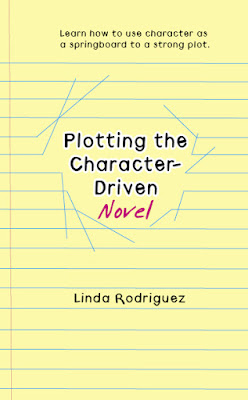Writers often make
resolutions to find time to write. I posted a blog about this
recently here.
However, even when
this resolution is successful and the writer creates a workable
writing schedule, such a resolution often ultimately fails because
often writers have more trouble motivating themselves to actually
write during the time they've scheduled than in finding or making the
time to write. In fact, one of the reasons we as writers so often
find ourselves over-committed and without dedicated time to write is
due to our procrastination and lack of motivation.
 To help with
that problem, I offer an excerpt from my new writing book, Plotting the
Character-Driven Novel, available in ebook and trade paperback
here.
To help with
that problem, I offer an excerpt from my new writing book, Plotting the
Character-Driven Novel, available in ebook and trade paperback
here.
The
trick is to motivate yourself to actually write in that time slot
you’ve created. Most of us find it easier to disappoint ourselves
than to disappoint other people, so if you can find a buddy or
partner to help keep you accountable, that’s a great way to
overcome that difficulty. Perhaps you two can call, text, or email
each other every writing day with goals before your writing time and
what you accomplished after that time is over. Or a group of writer
friends on Facebook can do this for each other. I know a number of
writers who post their day’s time spent writing or page totals on
Facebook, and get lots of positive feedback from their writer friends
for it—or consolation if they’ve missed their goal.
It’s
also important to set regular rewards for yourself for completing
planned segments of writing tasks. Putting your feet up with a cup of
tea and a special treat. Spending time reading a book you’ve wanted
to read. Buying yourself a book you want. Buying nice pens or blank
notebooks or whatever desk/office gizmo you’ve been wanting or
needing. Buying materials you’ve wanted for a craft project and--as
a later reward--giving yourself time to work on that project. Lunch
with one or more friends. Make a list of small, medium, and large
rewards for fulfilling various writing commitments.
Also,
schedule some creative refill time into each week and month. Take a
walking or library or bookstore or art gallery or museum break every
week, even if it’s only for thirty minutes. Take a nice blank book
(one of your rewards) and a nice pen (another reward) and visit a
lake, park, nature preserve, or riverside, just walking and sitting
and writing with no stated purpose. Describe in writing what you see,
what you feel, what you’re thinking, what you want to write someday
or otherwise do someday.
If
you’re serious about writing, reclaim your power. Would you treat
your car the way you treat yourself? No, you would make sure it had
as much quality fuel as it needed. You would buy new tires for it
when they were needed. You would check its oil and get it regular
tune-ups and other routine maintenance. You would do all of this
because you know these things are important to keep it functioning at
its peak. Show yourself as much consideration as you do your car. No
car will run on empty, and neither do writers.
Make
time to remember how to dream, and make time to bring those dreams
into reality. Visualize your successful life as a writer, and then
plan that change. Exercise your change muscles first by making small,
unimportant, non-threatening changes in private areas. Learn to make
a habit of changing things you are unhappy with—in your job, your
home, your relationships, yourself. Envision the life you want to
lead. Write it down. Check in with it often. Analyze problems. Get
back on the horse when you fall off, and fix the problems that led
you to fumble your plans or work routine. It’s always an ongoing
process. No one’s perfect, but the only way you can truly fail is
if you stop for good.

